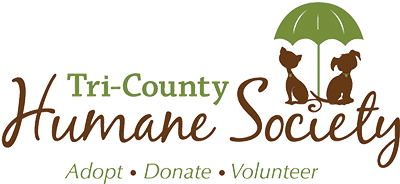
Tri-County Humane Society likes to share milestones with our friends. As we reported in our spring newsletter, the number of transfers we’ve taken in this year has significantly increased – 648 (as of publication time) compared with 297 in all of 2020.
The increase in transfers has led to another notable achievement: TCHS recently completed treatment for three dogs in our care who had heartworm disease, Ole Red, Clank, and KK Slider. Those three dogs came from a transfer coordinated with Animal Humane Society in the Twin Cities; those pups were from the South.
Heartworm is transmitted by mosquitoes, and thus is much more prevalent in the South because the region’s warmer weather means the bugs are out and biting for much longer. (Dogs cannot spread it to one another, and humans are not a natural host for them.)
TCHS Certified Veterinary Technician Rose Hegerle said when she first started at TCHS, the shelter saw heartworm disease cases in dogs from time to time, but the shelter usually sent those dogs to area clinics for treatment. Things are a little different now: More data on expedited protocols for heartworm treatment means it can be completed in the shelter and the dog can be sent home to heal in its new home rather than be in a TCHS foster home for an extended period of time.
TCHS Animal Care Manager Laura Lund said when she started at the shelter more than a decade ago, heartworm disease would have been a barrier for adoption, and the dog most likely would have been euthanized. Then TCHS switched to outpatient treatment (sending the dogs to clinics), but that did require coordination and a long-term foster.
The shelter’s newer way of treating heartworm disease, done in conjunction with TCHS veterinarian Dr. Anne Lottie, works well for the dog and the shelter, Lund said.
“We don’t have to keep them in the shelter long term, (when) we don’t have space to do that,” she said. “Obviously, they recover better in a home setting with someone who has made the commitment to adopt them.”
Two of the three recent dogs treated for heartworm disease – Ole Red and Clank – have already been adopted. TCHS’ guidance is that the adopter establish a relationship with a veterinarian so a plan can be made for the dogs’ follow-up care. (It depends on the clinic, Hegerle said; more testing is needed several months after the treatment is completed.) The dogs need to be on restricted exercise for a period of time, too, typically for six to eight weeks after injectable treatments, she added.
All three TCHS dogs reacted very well to the treatment, Hegerle said, or they would not have been cleared for adoption. Time will tell, but hopefully they will have long, healthy lives, she said.
Hegerle stressed that every dog should have regular heartworm screening and be on a monthly preventative; she urged pet owners to talk with their vets. Any dog, even an exclusively indoors one, could be at risk; mosquitoes do get into homes.
Cats aren’t a preferred host but can get heartworm, too, Hegerle said. Cat owners also should talk to their veterinarian about a prevention program.
Visit www.heartwormsociety.org for more information about the disease.









